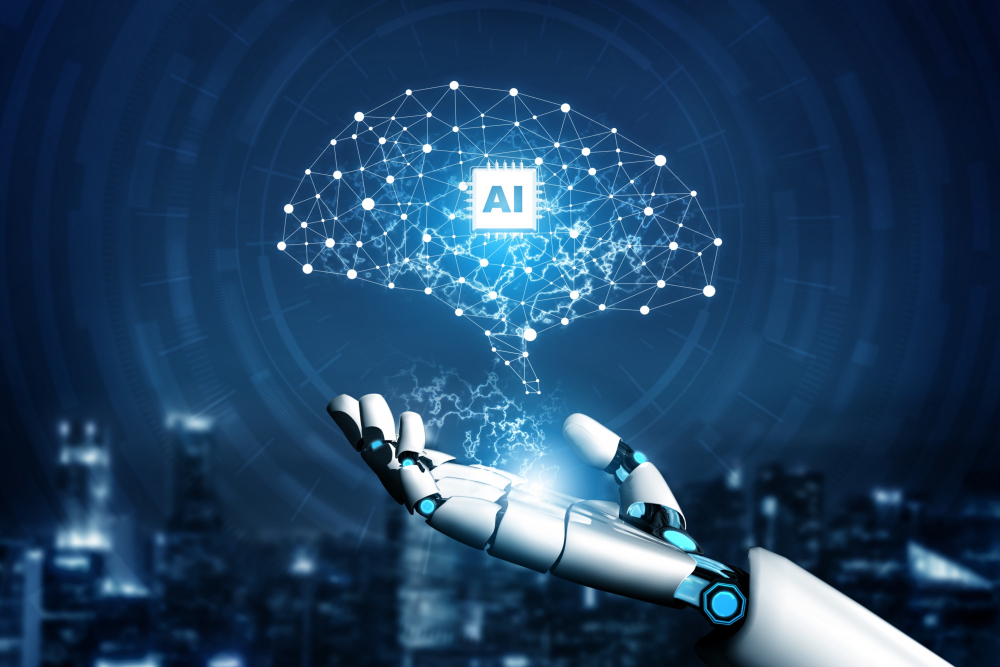From frictionless e-commerce to immersive 3D games, technology keeps us on the edge of our seats. But just like any frontier, hidden dangers lurk in the shadows – cyber threats that can disrupt our progress and steal valuable data.
So, the question is: Are you ready to navigate this exciting yet dangerous terrain?
This blog series delves into the cutting-edge world of Artificial Intelligence (AI) and its role as a powerful guardian in the digital realm. We’ll explore how AI is:
- Fortifying the e-commerce ecosystem, ensuring your favourite Android apps remain secure from cyberattacks.
- Transforming 3D game development, building fortresses around your virtual worlds.
- Shielding your wearable devices, turning them from potential vulnerabilities into trusted companions.
Join us on this exciting journey as we explore the dynamic intersection of technology and cybersecurity, where AI is leading the charge in securing our digital future. Buckle up, and get ready to be amazed!
The Expanding Threat Landscape: How AI is Reshaping Cybersecurity
The digital age has ushered in a dynamic era of opportunity and progress. However, this interconnected world has also created fertile ground for a multitude of evolving cybersecurity threats. From sophisticated malware and ransomware attacks to data breaches and identity theft, organizations and individuals alike face a constantly shifting landscape of risk. Traditional security measures, while valuable, are often insufficient to effectively combat these increasingly complex threats.
This is where Artificial Intelligence (AI) emerges as a transformative force in cybersecurity. AI is not merely a futuristic concept; it is actively shaping the present by offering advanced capabilities for identifying, preventing, and mitigating cyber threats. In the following sections, we will explore the crucial role AI plays in safeguarding the digital frontier.
AI-Powered Threat Detection: Staying Ahead of the Curve
The ever-evolving landscape of cyber threats demands a proactive approach to security. Traditional methods that rely on identifying known threats leave organizations vulnerable to novel attacks. This is where AI-powered threat detection steps in, offering a powerful line of defense.
Proactive Threat Recognition
AI excels at recognizing anomalies and patterns that deviate from established norms. Unlike signature-based systems limited to known threats, AI utilizes machine learning algorithms to analyze vast swathes of data. This allows it to detect subtle deviations that might indicate an emerging threat, empowering organizations to take preventative action before significant damage occurs.
Consider an organization using a tablet app development platform. An AI-powered security solution could analyze user activity within the development environment, identifying patterns of file access and modification. If a developer suddenly begins accessing sensitive source code files they haven’t interacted with previously, the AI would recognize this anomaly and flag it for investigation. This proactive approach allows for the identification and mitigation of threats before they can compromise sensitive data or disrupt development workflows.
Behavioral Analysis for Enhanced Security
AI’s ability to analyze user behavior and network activity unlocks a powerful layer of security. It can monitor and learn typical user interactions with systems and data, allowing it to identify potential breaches when deviations occur.
For example, imagine an employee who typically accesses a limited set of customer records for their daily tasks. An AI system would learn this behavior pattern. If this same employee suddenly attempts to access a large volume of highly sensitive financial data, the AI would recognize this significant deviation and flag it as a potential security breach. This behavior analysis is particularly valuable for detecting insider threats or compromised user accounts, which can be a major security vulnerability within many organizations.
By leveraging both proactive threat recognition and user behavior analysis, AI-powered solutions provide a comprehensive and adaptable defense against evolving cyber threats.
The Power of Adaptive Defense
AI cybersecurity systems are not passive fortifications. They are constantly learning and evolving alongside the threat landscape. Each encounter with a new threat provides valuable data that AI algorithms can analyze. This allows the system to refine its detection methods and adapt its defense mechanisms in real-time.
Imagine an AI system encountering a novel phishing attempt. By analyzing the email’s language, structure, and sender information, the AI can learn to identify similar attempts in the future. This continuous learning process ensures that the AI system remains effective against evolving threats.
The ability to adapt in real-time makes AI a powerful ally in the fight against cybercrime. Unlike traditional, signature-based solutions that struggle with novel threats, AI-powered systems can continuously improve their defenses, staying one step ahead of attackers and safeguarding your valuable data.
AI is transforming mobile app development and e-commerce.
The realm of e-commerce and mobile app development has witnessed a significant transformation with the integration of Artificial Intelligence (AI). AI’s capabilities are proving to be a game-changer, enhancing both the customer experience and overall business operations.
E-commerce: A Tailored Shopping Experience
In the world of e-commerce, AI is being harnessed to personalize the shopping journey for each customer. By analyzing user behavior and purchase history, AI algorithms can generate personalized product recommendations. This not only streamlines the shopping experience but also leads to increased sales and improved customer satisfaction. Additionally, AI plays a vital role in fostering stronger customer communication. Chatbots powered by AI can answer customer queries efficiently, offering 24/7 support and personalized guidance.
Fraud Detection: Safeguarding Transactions
AI serves as a powerful tool for safeguarding both consumers and businesses from financial losses. AI-powered systems can analyze transactions in real-time, detecting anomalies and patterns indicative of fraudulent activity. This proactive approach helps prevent fraudulent transactions before they occur, protecting sensitive financial information and ensuring a secure online shopping environment.
Optimizing Inventory Management
Beyond the customer experience, AI offers significant benefits in the area of inventory management. AI algorithms can analyze sales trends, customer preferences, and seasonal fluctuations to predict demand accurately. This allows businesses to optimize inventory levels, ensuring products are readily available when customers need them. By minimizing the risk of overstocking or understocking, AI helps businesses reduce wastage and improve overall profitability.
AI-Powered Apps: Transforming Mobile Development
The impact of AI extends beyond e-commerce platforms, influencing the very core of mobile app development. Developers are increasingly incorporating AI functionalities into Android and iPhone apps, resulting in smarter and more user-friendly applications. These AI-powered apps can learn and adapt to user preferences, offering features like predictive text suggestions and enhanced image recognition capabilities. This personalized approach creates a more intuitive and engaging user experience.
Security: Fortifying Mobile Applications
AI plays a critical role in bolstering the security of mobile apps. AI algorithms can be implemented to detect and prevent malicious activities within the app, safeguarding sensitive user data from unauthorized access or breaches. This proactive approach to security helps build trust with users and protects them from potential cyber threats.
User Engagement: Keeping Users Coming Back
Mobile apps powered by AI can analyze user behaviour patterns and tailor the user experience accordingly. By understanding user preferences and engagement levels, AI can recommend relevant content, features, and functionalities. This personalized approach keeps users engaged and fosters long-term loyalty to the app.
Overall, AI is rapidly transforming the landscape of e-commerce and mobile app development. From personalizing the customer journey to optimizing operations and enhancing security, AI offers a multitude of benefits for both businesses and users. As AI technology continues to evolve, we can expect even more innovative applications that will redefine the way we interact with the digital world.
AI Fortifying Security in the World of Games and Wearables
The digital entertainment landscape has seen a surge in popularity with the rise of immersive 3D games developed using platforms like Unity 3D. However, even the thrilling world of gaming isn’t immune to cybersecurity threats. Here’s where AI steps in, offering a powerful shield against these threats.
Unity 3D Game Development: Ensuring a Secure Gaming Experience
AI can be a valuable asset in safeguarding game servers from malicious attacks. By analyzing network traffic patterns, AI algorithms can detect and mitigate Distributed Denial of Service (DDoS) attacks that aim to disrupt gameplay. This ensures a smooth and uninterrupted experience for players.
Combating Cheating: A Fairer Gaming Environment
Maintaining a fair and competitive environment is essential for online games. AI can be instrumental in identifying instances of cheating, such as the use of aimbots or other unauthorized programs. AI algorithms can analyze player behavior and pinpoint anomalies suggestive of cheating, allowing developers to take appropriate action and maintain a level playing field for all.
Securing In-Game Transactions and User Data
The integration of AI within Unity 3D game development services is also enhancing in-game security. AI can monitor in-game transactions, detecting and preventing fraudulent activities that could harm both players and developers. Additionally, AI can safeguard sensitive user data, such as login credentials and payment information, from unauthorized access or breaches. This comprehensive approach fosters trust within the gaming community and protects players’ privacy.
AI: Safeguarding Wearable Devices in an Increasingly Connected World
Wearable technology, encompassing smartwatches and fitness trackers, has become a ubiquitous presence in our lives. However, the convenience offered by these devices comes with inherent security challenges. Here’s how AI can help mitigate these risks.
Protecting Sensitive Health Data
Many wearables collect and store a wealth of personal health data. AI can play a crucial role in safeguarding this sensitive information. By analyzing access patterns and flagging anomalies, AI systems can detect and prevent unauthorized access to user health data, ensuring patient privacy.
Securing Communication Channels
Wearable devices often connect wirelessly with smartphones and other devices, creating potential vulnerabilities. AI can monitor these communication channels in real-time, detecting and preventing data breaches or unauthorized access attempts. This proactive approach ensures the secure transmission of data between devices.
Enhanced Device Authentication
AI can be employed to strengthen the authentication process for wearable devices. By implementing AI-powered multi-factor authentication, developers can significantly reduce the risk of unauthorized access. This ensures that only authorized users can control and access sensitive data stored on wearable devices.
Conclusion: AI – A Necessity for a Secure Digital Future
In today’s interconnected digital world, the synergy between technological advancements and robust cybersecurity measures is paramount. The emergence of AI presents a powerful tool for combating the ever-evolving landscape of cyber threats. Its applications extend far beyond data security, empowering individuals and businesses to fully embrace the potential of technology, whether in e-commerce, mobile app development, game development, or the realm of wearable devices. As we navigate the ever-changing digital landscape, leveraging AI in cybersecurity is not merely an option; it’s a necessity for a secure and prosperous digital future.


